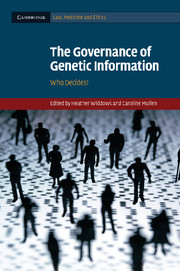Book contents
- Frontmatter
- Contents
- Notes on contributors
- Preface
- Introduction
- SECTION I Problematising governance of genetic information
- SECTION II Ethical frameworks of governance
- SECTION III Redesigning governance
- 7 Involving publics in biobank governance: moving beyond existing approaches
- 8 Genetic information and public opinion
- 9 Harmonisation and standardisation in ethics and governance: conceptual and practical challenges
- Bibliography
- Index
7 - Involving publics in biobank governance: moving beyond existing approaches
Published online by Cambridge University Press: 02 February 2010
- Frontmatter
- Contents
- Notes on contributors
- Preface
- Introduction
- SECTION I Problematising governance of genetic information
- SECTION II Ethical frameworks of governance
- SECTION III Redesigning governance
- 7 Involving publics in biobank governance: moving beyond existing approaches
- 8 Genetic information and public opinion
- 9 Harmonisation and standardisation in ethics and governance: conceptual and practical challenges
- Bibliography
- Index
Summary
This chapter examines the crucial issue of how to include people well in biobank governance. We use the example of UK Biobank to illustrate our discussion because it is ground-breaking in its approach to governance and because, in terms of public engagement, the project has been criticised for its approach to public consultation. In reaction to these perceived failings there have been calls for greater participant involvement in the running and oversight of UK Biobank. More particularly, and more recently, Winickoff has proposed a ‘shareholder model’ which seeks to ‘… move beyond public consultation to embrace participatory forms of resource entitlement’. Winickoff draws on corporate modelling to argue for more direct representation of UK Biobank participants in the project's decision making and governance processes. As such, he argues that public engagement must move from consultation to representation. In other realms, representation itself is found wanting, with writers such as Pimbert and Wakeford arguing that engagement exercises ‘in the design of technologies’ should embrace deliberative democratic practices to ‘… democratize [sic] policy making by moving beyond representative democracy and traditional forms of consultation’. We examine these calls to move beyond consultation to representation and from representation to more deliberative and inclusive processes of participation. Perhaps ironically, we agree with Winickoff that there is value in models from the corporate sphere; not on a shareholder approach, however, but on a stakeholder approach which goes beyond even that which is proposed in the discourse on deliberative democracy. Moreover, and despite early criticisms of UK Biobank, we find valuable evidence within that model of what it means to involve people well.
- Type
- Chapter
- Information
- The Governance of Genetic InformationWho Decides?, pp. 151 - 177Publisher: Cambridge University PressPrint publication year: 2009
- 7
- Cited by



